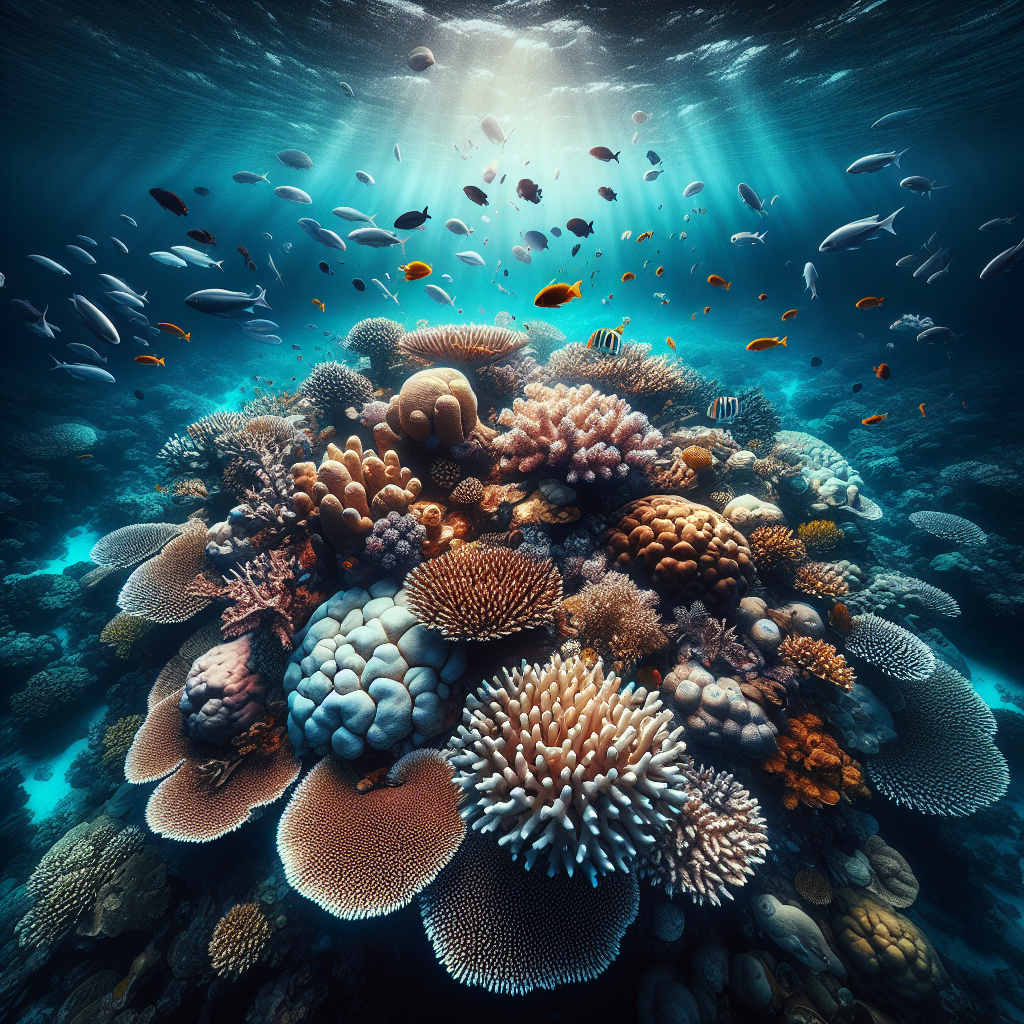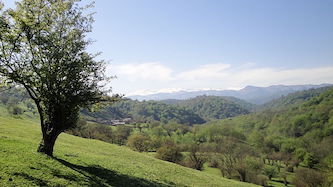Recent research has highlighted the alarming impact of climate change on the Great Barrier Reef, revealing that temperatures in and around this iconic ecosystem have reached their highest levels in 400 years. Over the past decade, extreme heat has triggered five mass coral bleaching events, underscoring the urgent threat posed to this natural wonder. A study published in the journal Nature emphasizes that these rising temperatures represent an “existential threat” to the reef, prompting scientists to call for immediate action to address the climate crisis.
The research team, led by Professor Helen McGregor from the University of Wollongong, utilized samples taken from the skeletons of ancient corals to analyze historical environmental changes. These coral cores serve as valuable records, providing chemical indicators of the conditions in which the corals have lived for centuries. By cross-referencing these findings with historical sea temperature data from the UK’s Hadley Centre, the researchers confirmed that the recent decade has experienced unprecedented warmth, raising concerns about the reef’s future.
Dr. Benjamin Henley, the lead researcher, expressed his dismay at the findings, noting that the current situation is dire for the Great Barrier Reef. However, he also highlighted a potential path forward, suggesting that if global efforts to limit warming can be successfully implemented, there remains a chance for the reef and other coral ecosystems to survive in their current form. This optimism rests on the ability to unite globally to combat climate change and protect these vital marine habitats.
Corals, which are actually animals rather than plants, thrive within a specific temperature range and rely on a symbiotic relationship with algae for nourishment and color. When sea temperatures rise excessively, corals expel their algae, leading to a phenomenon known as bleaching. While bleached corals can sometimes recover, prolonged heat stress can prevent this recovery, resulting in a stark transformation of the reef’s ecosystem. Dr. Henley described the visual impact of bleaching as unappealing, with bleached corals eventually becoming overgrown by other algae, turning them brown.
As the Great Barrier Reef holds the status of a UNESCO World Heritage site, there is hope that this research will prompt the organization to consider designating it as “endangered.” Professor McGregor emphasized the importance of this designation, stating it would send a strong message about the severity of the situation. She urged for political will to be set aside in favor of action, as the necessary international agreements to limit global temperature rise are already in place. The time for decisive action is now, as the future of the Great Barrier Reef hangs in the balance.
Original news source: 400-year record heat threat to Great Barrier Reef (BBC)
🎧 Listen:
Slow
Normal
Fast
📖 Vocabulary:
| 1 | alarming | Causing worry or fear |
| 2 | ecosystem | A community of living organisms interacting with their environment |
| 3 | bleaching | The process of losing color, often due to stress |
| 4 | existential | Relating to existence or survival |
| 5 | unprecedented | Never done or known before |
| 6 | dismay | A feeling of distress or disappointment |
| 7 | thrive | To grow or develop well |
| 8 | symbiotic | A mutually beneficial relationship between different organisms |
| 9 | phenomenon | An observable event or occurrence |
| 10 | stark | Clear and distinct in appearance or contrast |
| 11 | designation | The act of officially naming or classifying something |
| 12 | severity | The seriousness or intensity of a situation |
| 13 | decisive | Having the power to make decisions quickly and effectively |
| 14 | nourishment | The substances necessary for growth and health |
| 15 | transformation | A complete change in form or appearance |
Group or Classroom Activities
Warm-up Activities:
– CHARADES
Instructions: Divide the class into small groups. Each group will take turns acting out terms related to the article (e.g., coral bleaching, climate change, Great Barrier Reef) without speaking, while the other groups guess the term. This will help students practice vocabulary and improve their ability to convey meaning through non-verbal communication.
– OPINION POLL
Instructions: Have students create a list of statements related to climate change and the Great Barrier Reef (e.g., “Climate change is the biggest threat to marine life”). Students will then circulate around the room, asking their classmates to agree or disagree with these statements and record their responses. Afterward, students can discuss the results as a class.
– MIND MAP
Instructions: Provide students with a large sheet of paper or a whiteboard. Ask them to create a mind map that visually represents the key concepts from the article, such as “Great Barrier Reef,” “climate change,” “coral bleaching,” and “scientific research.” Encourage them to add subtopics and connections between ideas to deepen their understanding of the content.
– FUTURE PREDICTIONS
Instructions: In pairs, have students discuss and write down their predictions for the future of the Great Barrier Reef based on the findings from the article. They should consider various scenarios, including best-case and worst-case outcomes. Afterward, each pair can share their predictions with the class, fostering discussion on environmental issues.
– HEADLINE CREATION
Instructions: Ask students to create a catchy headline for the article that captures its main message. They should consider the tone, audience, and key points of the article. Once they have crafted their headlines, students can share them in small groups and discuss the effectiveness of each headline in conveying the urgency of the climate crisis.
🤔 Comprehension Questions:
1. What recent findings have researchers discovered about the temperatures affecting the Great Barrier Reef?
2. How have extreme heat events impacted the coral population in the Great Barrier Reef over the past decade?
3. What method did the research team use to analyze historical environmental changes related to the reef?
4. What potential solution did Dr. Benjamin Henley suggest for the survival of the Great Barrier Reef?
5. How do rising sea temperatures affect the symbiotic relationship between corals and algae?
6. What visual changes occur in corals when they experience bleaching due to excessive heat?
7. Why is the designation of the Great Barrier Reef as “endangered” significant, according to Professor McGregor?
8. What actions does the article suggest are necessary to protect the Great Barrier Reef from climate change?
Go to answers ⇩
🎧✍️ Listen and Fill in the Gaps:
Recent research has highlighted the alarming impact of (1)______ change on the Great Barrier Reef, revealing that temperatures in and around this iconic ecosystem have reached their (2)______ levels in 400 years. Over the past decade, extreme heat has triggered five mass coral bleaching events, underscoring the urgent threat posed to this natural wonder. A (3)______ published in the (4)______ Nature emphasizes that these rising temperatures represent an “existential threat” to the reef, prompting scientists to call for immediate action to address the climate crisis.
The research team, led by Professor Helen McGregor from the University of Wollongong, utilized samples taken from the skeletons of ancient corals to analyze historical environmental changes. These coral cores serve as valuable records, providing chemical indicators of the conditions in which the corals have lived for centuries. By cross-referencing these findings with historical sea temperature data from the UK’s Hadley Centre, the researchers confirmed that the (5)______ decade has experienced unprecedented warmth, raising concerns about the reef’s future.
Dr. Benjamin Henley, the lead researcher, expressed his (6)______ at the findings, noting that the (7)______ situation is dire for the Great Barrier Reef. However, he also highlighted a potential path forward, suggesting that if global efforts to (8)______ warming can be successfully implemented, there remains a chance for the reef and other coral ecosystems to survive in their current form. This optimism (9)______ on the ability to unite globally to combat climate change and protect these vital marine (10)______.
Corals, which are actually animals rather than plants, thrive within a specific temperature range and rely on a symbiotic relationship with algae for (11)______ and color. When sea temperatures rise excessively, corals expel their algae, leading to a phenomenon known as bleaching. While bleached corals can sometimes (12)______, prolonged heat stress can prevent this recovery, resulting in a stark transformation of the reef’s ecosystem. Dr. Henley described the visual impact of bleaching as unappealing, with bleached corals eventually (13)______ overgrown by other (14)______, turning them brown.
As the Great Barrier Reef holds the status of a UNESCO World Heritage site, there is hope that this research will prompt the organization to consider designating it as “endangered.” Professor McGregor emphasized the importance of this (15)______, stating it would send a strong message about the severity of the situation. She urged for political will to be set aside in favor of action, as the (16)______ international agreements to limit global temperature rise are already in place. The time for decisive action is now, as the future of the Great Barrier Reef hangs in the balance.
Go to answers ⇩
💬 Discussion Questions:
Students can ask a partner these questions, or discuss them as a group.
1. What is your opinion on the importance of preserving natural wonders like the Great Barrier Reef?
2. How would you feel if you were to visit a coral reef and found it bleached and lifeless?
3. Do you think individuals can make a significant impact on combating climate change? Why or why not?
4. What is a personal experience you have had with environmental issues, such as pollution or climate change?
5. How do you think governments should prioritize climate change in relation to other pressing issues?
6. Do you like learning about marine ecosystems? Why or why not?
7. What is a solution you believe could effectively address the challenges faced by coral reefs?
8. How would you react if you learned that a beloved natural site, like the Great Barrier Reef, was declared endangered?
9. Do you think it is possible for global cooperation to effectively combat climate change? Why or why not?
10. What is a significant change you have made in your own life to help the environment?
11. How would you feel if future generations could not experience natural wonders due to climate change?
12. Do you think educational institutions should place more emphasis on teaching about climate change? Why or why not?
13. What is a way you believe technology can help in the fight against climate change?
14. How do you think the media influences public perception of climate change and environmental issues?
15. Do you think that designating the Great Barrier Reef as “endangered” would lead to meaningful action? Why or why not?
Individual Activities
📖💭 Vocabulary Meanings:
Match each word to its meaning.
Words:
1. alarming
2. ecosystem
3. bleaching
4. existential
5. unprecedented
6. dismay
7. thrive
8. symbiotic
9. phenomenon
10. stark
11. designation
12. severity
13. decisive
14. nourishment
15. transformation
Meanings:
(A) The seriousness or intensity of a situation
(B) To grow or develop well
(C) The substances necessary for growth and health
(D) Relating to existence or survival
(E) An observable event or occurrence
(F) A feeling of distress or disappointment
(G) A mutually beneficial relationship between different organisms
(H) A community of living organisms interacting with their environment
(I) Never done or known before
(J) A complete change in form or appearance
(K) The process of losing color, often due to stress
(L) Having the power to make decisions quickly and effectively
(M) Causing worry or fear
(N) Clear and distinct in appearance or contrast
(O) The act of officially naming or classifying something
Go to answers ⇩
🔡 Multiple Choice Questions:
1. What recent findings have been highlighted regarding the Great Barrier Reef?
(a) Temperatures have reached their highest levels in 400 years
(b) The reef is thriving
(c) Coral populations are increasing
(d) There are no significant changes in the reef’s ecosystem
2. How many mass coral bleaching events have occurred in the past decade due to extreme heat?
(a) Three
(b) Seven
(c) Five
(d) Two
3. Who led the research team that studied the Great Barrier Reef?
(a) Dr. Benjamin Henley
(b) Professor Helen McGregor
(c) Dr. Jane Goodall
(d) Professor Richard Dawkins
4. What method did the researchers use to analyze historical environmental changes?
(a) Satellite imagery
(b) Underwater photography
(c) Ocean current measurements
(d) Samples from ancient coral skeletons
5. What is the primary concern regarding the rising temperatures for the Great Barrier Reef?
(a) They pose an existential threat
(b) They will attract more tourists
(c) They will enhance coral growth
(d) They will improve water clarity
6. What phenomenon occurs when corals expel their algae due to rising sea temperatures?
(a) Growth
(b) Bleaching
(c) Reproduction
(d) Photosynthesis
7. What status does the Great Barrier Reef hold that gives it international recognition?
(a) National Park
(b) Marine Reserve
(c) UNESCO World Heritage site
(d) Biosphere Reserve
8. What did Professor McGregor urge for in response to the situation of the Great Barrier Reef?
(a) Increased tourism
(b) More research funding
(c) A ban on fishing in the area
(d) Political will to be set aside for action
Go to answers ⇩
🕵️ True or False Questions:
1. The research team, led by Professor Helen McGregor, analyzed contemporary environmental changes using samples from ancient coral skeletons.
2. Dr. Benjamin Henley, the lead researcher, expressed optimism about the promising situation for the Great Barrier Reef but noted a potential path forward even if global warming is not limited.
3. There is doubt that the research will lead to the Great Barrier Reef being designated as “endangered” by UNESCO, diminishing the urgency of the situation.
4. Recent research indicates that temperatures around the Great Barrier Reef have not reached their highest levels in 400 years.
5. Over the past decade, the Great Barrier Reef has experienced five mass coral bleaching events due to extreme heat.
6. Corals rely on a symbiotic relationship with algae for nourishment and can undergo bleaching when sea temperatures rise excessively.
7. The findings from the coral cores were cross-referenced with historical sea temperature data from the UK’s Hadley Centre.
8. A study published in the journal Nature describes rising temperatures as an “existential threat” to the Great Barrier Reef.
Go to answers ⇩
📝 Write a Summary:
Write a summary of this news article in two sentences.
Check your writing now with the best free AI for English writing!
Writing Questions:
Answer the following questions. Write as much as you can for each answer.
Check your answers with our free English writing assistant!
1. What evidence do researchers provide to support the claim that temperatures around the Great Barrier Reef have reached unprecedented levels?
2. How does the relationship between corals and algae contribute to the health of the reef, and what happens during coral bleaching?
3. What potential solutions do scientists propose to help protect the Great Barrier Reef from the impacts of climate change?
4. Why is the designation of the Great Barrier Reef as “endangered” significant, according to Professor McGregor?
5. What role does international cooperation play in addressing the climate crisis affecting the Great Barrier Reef?
✅ Answers
🤔✅ Comprehension Question Answers:
1. What recent findings have researchers discovered about the temperatures affecting the Great Barrier Reef?
Researchers have discovered that temperatures in and around the Great Barrier Reef have reached their highest levels in 400 years.
2. How have extreme heat events impacted the coral population in the Great Barrier Reef over the past decade?
Extreme heat has triggered five mass coral bleaching events in the past decade, posing an urgent threat to the coral population.
3. What method did the research team use to analyze historical environmental changes related to the reef?
The research team utilized samples taken from the skeletons of ancient corals to analyze historical environmental changes, providing valuable records of past conditions.
4. What potential solution did Dr. Benjamin Henley suggest for the survival of the Great Barrier Reef?
Dr. Benjamin Henley suggested that if global efforts to limit warming can be successfully implemented, there remains a chance for the reef and other coral ecosystems to survive in their current form.
5. How do rising sea temperatures affect the symbiotic relationship between corals and algae?
Rising sea temperatures cause corals to expel their algae, which are essential for their nourishment and color, leading to coral bleaching.
6. What visual changes occur in corals when they experience bleaching due to excessive heat?
When corals experience bleaching, they become visually unappealing and eventually can be overgrown by other algae, turning them brown.
7. Why is the designation of the Great Barrier Reef as “endangered” significant, according to Professor McGregor?
The designation as “endangered” would send a strong message about the severity of the situation and emphasize the need for political will and action to protect the reef.
8. What actions does the article suggest are necessary to protect the Great Barrier Reef from climate change?
The article suggests that immediate action is necessary to address the climate crisis, including the implementation of international agreements to limit global temperature rise.
Go back to questions ⇧
🎧✍️✅ Listen and Fill in the Gaps Answers:
(1) climate
(2) highest
(3) study
(4) journal
(5) recent
(6) dismay
(7) current
(8) limit
(9) rests
(10) habitats
(11) nourishment
(12) recover
(13) becoming
(14) algae
(15) designation
(16) necessary
Go back to questions ⇧
📖💭✅ Vocabulary Meanings Answers:
1. alarming
Answer: (M) Causing worry or fear
2. ecosystem
Answer: (H) A community of living organisms interacting with their environment
3. bleaching
Answer: (K) The process of losing color, often due to stress
4. existential
Answer: (D) Relating to existence or survival
5. unprecedented
Answer: (I) Never done or known before
6. dismay
Answer: (F) A feeling of distress or disappointment
7. thrive
Answer: (B) To grow or develop well
8. symbiotic
Answer: (G) A mutually beneficial relationship between different organisms
9. phenomenon
Answer: (E) An observable event or occurrence
10. stark
Answer: (N) Clear and distinct in appearance or contrast
11. designation
Answer: (O) The act of officially naming or classifying something
12. severity
Answer: (A) The seriousness or intensity of a situation
13. decisive
Answer: (L) Having the power to make decisions quickly and effectively
14. nourishment
Answer: (C) The substances necessary for growth and health
15. transformation
Answer: (J) A complete change in form or appearance
Go back to questions ⇧
🔡✅ Multiple Choice Answers:
1. What recent findings have been highlighted regarding the Great Barrier Reef?
Answer: (a) Temperatures have reached their highest levels in 400 years
2. How many mass coral bleaching events have occurred in the past decade due to extreme heat?
Answer: (c) Five
3. Who led the research team that studied the Great Barrier Reef?
Answer: (b) Professor Helen McGregor
4. What method did the researchers use to analyze historical environmental changes?
Answer: (d) Samples from ancient coral skeletons
5. What is the primary concern regarding the rising temperatures for the Great Barrier Reef?
Answer: (a) They pose an existential threat
6. What phenomenon occurs when corals expel their algae due to rising sea temperatures?
Answer: (b) Bleaching
7. What status does the Great Barrier Reef hold that gives it international recognition?
Answer: (c) UNESCO World Heritage site
8. What did Professor McGregor urge for in response to the situation of the Great Barrier Reef?
Answer: (d) Political will to be set aside for action
Go back to questions ⇧
🕵️✅ True or False Answers:
1. The research team, led by Professor Helen McGregor, analyzed contemporary environmental changes using samples from ancient coral skeletons. (Answer: False)
2. Dr. Benjamin Henley, the lead researcher, expressed optimism about the promising situation for the Great Barrier Reef but noted a potential path forward even if global warming is not limited. (Answer: False)
3. There is doubt that the research will lead to the Great Barrier Reef being designated as “endangered” by UNESCO, diminishing the urgency of the situation. (Answer: False)
4. Recent research indicates that temperatures around the Great Barrier Reef have not reached their highest levels in 400 years. (Answer: False)
5. Over the past decade, the Great Barrier Reef has experienced five mass coral bleaching events due to extreme heat. (Answer: True)
6. Corals rely on a symbiotic relationship with algae for nourishment and can undergo bleaching when sea temperatures rise excessively. (Answer: True)
7. The findings from the coral cores were cross-referenced with historical sea temperature data from the UK’s Hadley Centre. (Answer: True)
8. A study published in the journal Nature describes rising temperatures as an “existential threat” to the Great Barrier Reef. (Answer: True)
Go back to questions ⇧















